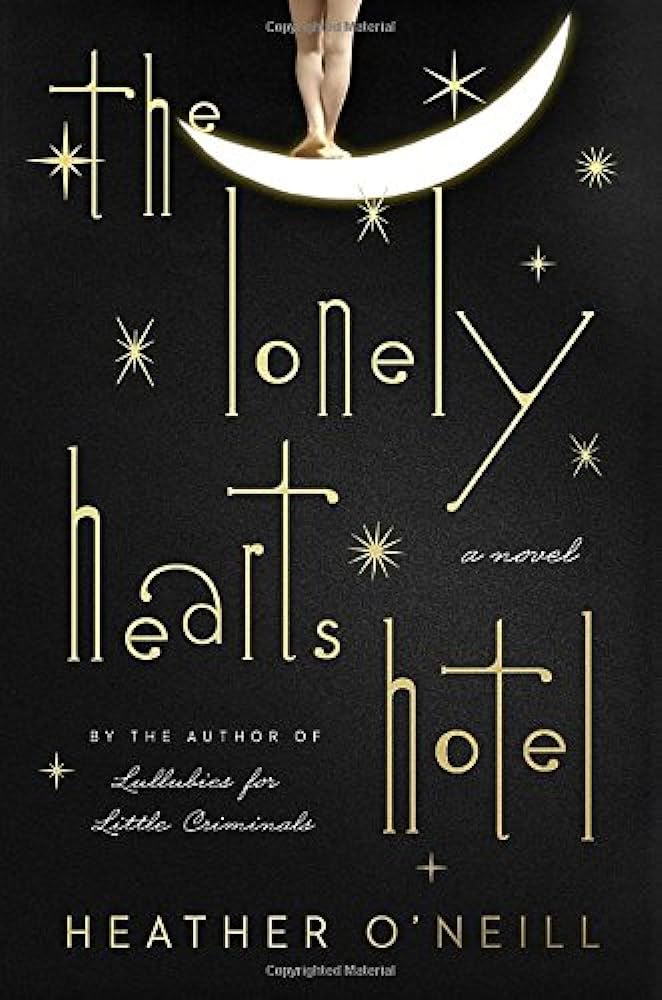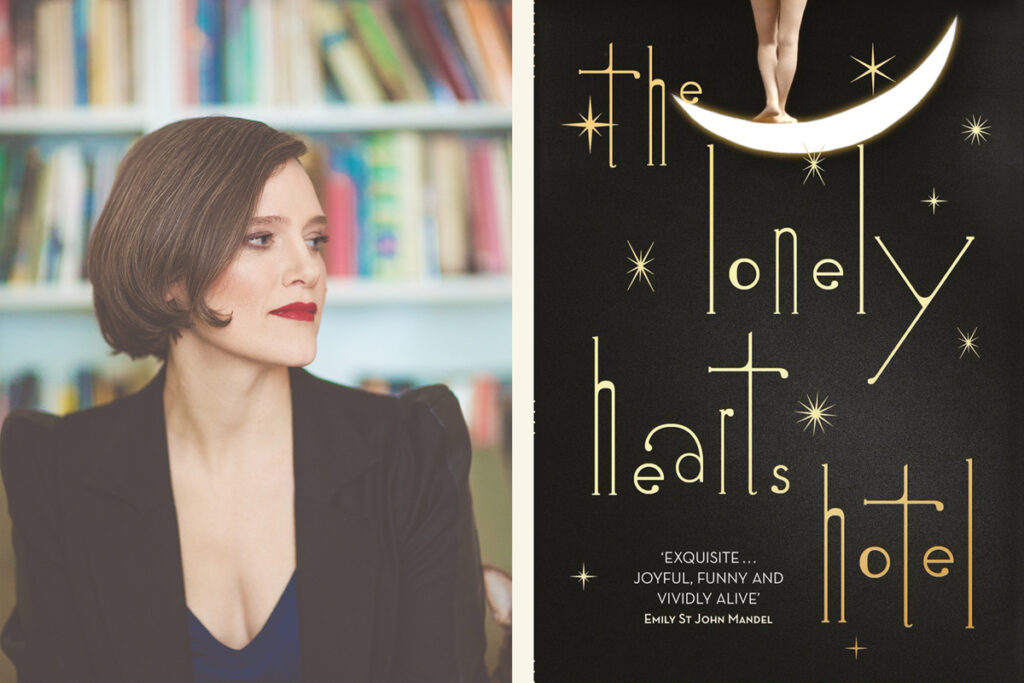From the Women’s Prize Archives.
Brilliant author Heather O’Neill has been longlisted for this year’s Baileys Women’s Prize for Fiction for The Lonely Hearts Hotel. Read on to learn about why Heather loves a good metaphor, why Montreal is so close to her heart and the stories from the Great Depression which read like Grimm’s Fairy Tales.
Your fiction is full of marvellous metaphors – why do you think they are so important in your work?
I adore a good metaphor. They force you to see the world as if for the first time, in a weird sensory, phenomenological, kind of way. Which is part of the shocking beauty ingredient of literature.
And they are so playful. They allow there to be so many different readings to an event or image that it creates a childlike, unpredictable, frightening and delightful world – one that can’t be properly grasped, or understood, but only imagined. My worlds are innocent and corrupt, and those states of being are implicit in each moment, so I employ metaphor to allow the two to co-exist.
They enable me to summon the mood through imagery instead of exposition. For instance, if a row of doorbells is described as looking like buttons, it is because the girl pushing them will get undressed and unbuttoned once she enters that building. The building becomes sexualizes and tense and vulnerable. When the girl enters it, she had begun her own seduction and undoing. A metaphor flirts with foreshadowing and the subconscious and the poetic possibility of things.
It also comes naturally to me, when I want to articulate at every moment in my writing that a thing is not a thing, but is bursting with wonder. Because the thing is yours. (It’s okay, I’m not sure what that meant either.)

Who are your literary heroines?
Orlando from Orlando. I remember finding a copy of Virginia Woolf’s novel Orlando at my high school library when I was fourteen. I had no idea what the novel was about. When Orlando wakes up and is a woman, I was astonished. It was a revelation to me about gender and who a character could be. Orlando was so entirely enormous that s/he encompasses times and genders. It made me feel that I could live a thousand lives should I please, which is the essence of being free.
Jane Eyre from Jane Eyre. There was a passive aggressive girl I met when I was 15 who told me that I looked like Jane Eyre. She was a rather erudite bully. Curious, I read the book and realized it wasn’t at all a compliment. But there was something about Jane that I related to: the alienation, the feeling of being an outcast, the dignity of the abused. Oddly enough, the same girl who told me I looked like Jane Eyre began harassing me on Twitter last year. I blocked and reported her. She continues to be cruel to me, but I have no idea why. Please leave Jane Eyre and me alone. We can’t understand why the world has heaped scorn on us, but we’ll have none of it.
Antoinette from Wild Sargasso Sea. Who tries to kill Jane Eyre’s boyfriend! I only wish she had. Firstly, I would like to say that I’ve had quite enough of men telling me that their first wives are crazy. Find another adjective, please. It’s a sort of attempt to discard of women, as though once they are no longer wanted by men, they are disposable. Wives are not disposable. They are quite wonderful people and you can’t reduce them to a bad marriage, or a good one, for that matter. Antoinette is this whole magnificent, sexual, trusting, guilt-ridden person. She is screwed over because she is a woman, and she lives that fury. Women are allowed to live in a state of rage.
Marian from Edible Woman and Yeong-hye from The Vegetarian. I liked Marian from Edible Woman in my late teens, when I began to feel alienated from my body, as it’s impossible not to as a young girl in the Western world. My body began to feel separate from myself, as though it was betraying me and trivializing me. I wanted to crawl out of it. I found Han Kang’s A Vegetarian a fascinating discussion of this topic too. The character Yeong-hye’s strange rebellion against the coopting of her body is amazing. I’m interested in female self-abnegation as a form of resistance, like Erika’s mutilation in Elfriede Jelinek’s The Piano Teacher. (Okay, my heroines are getting peculiar and dark!)
Joy from Poor Cow. When I was a young mother, I thought of Joy from Poor Cow as my best friend. She was the only one who was in the same predicament as me. Having the responsibility of raising a child, but also being in love with life, attracted to everyone, wanting a good time. I read it at least six times.
Isabel Archer from Portrait of a Lady. Isabel Archer has gotten me through a lot. When I’m in my more somber moods and try to figure out where I went wrong, I think of Isabel’s choices and how as women we are often duped by men who pretend to love us but desire to clip our wings. Once I was telling a boyfriend how I related to Isabel Archer and he got very upset and said he’d have none of that “man-hating.”
Oh, I also like Nan from Tipping the Velvet. She was so wonderful and moral. I like a character who is in compromising positions, and yet is so perfectly good. I also have a particular intellectual and wicked adoration for the fairy tale women who inhabit the works of Helen Oyeyemi, Kelly Link and Angela Carter.
Much of your work is situated in Montreal, where you live – why do you think the city has so much magic as a setting?
It is magical. I wish that nothing about it would change. It’s a bit ramshackle, but the architecture is so sweet and unassuming and lovely. It gets buried in the snow, so we’re inside too much. There’s nothing to do but read and write. People will discuss anything with you on the subway. All the big questions.
Of course, I have always retained the child-like lens through which I perceived Montreal to begin with. There was a catnip bush near the building I grew up in. Every day I would walk to school and I would pass a dozen cats who would be stoned and walking backwards and laughing at the sky. That’s why there are so many mad cats in my books.
And that is why there is so much of everything in my book. Because I loved it as a child!
The Lonely Hearts Hotel is set during The Great Depression, did you do any particular research to enable you to write convincingly about this period?
I had been reading about that period in North America for a while, having an interest in it since I was maybe twelve.
For this novel, I read up on history particularly of women and children at the time. All the fascinating most helpful ones were written in French. Luckily, I speak it very well. There’s a fantastic historian named Andrée Lévesque whose writings on women in Quebec in the early part of the century were quite amazing. And I met with a few museum curators who showed me their treasures.
I also based it on stories that my dad had told me. He was a child during the Depression in Montreal. He had some peculiar stories. About how he could only afford the hotdog bun, but no hotdog inside. How he stole a pie from the bakery. About the thieves in the neighborhood who would give him minor tasks. I found those tales so beautiful and rich as a child. They were like the Grimm’s Brothers fairytales.
I also had been researching chorus girls and clowns from that era. I looked through books in the basement at McGill that had such tiny beautiful details. Like one about dogs who would show up at the circus train, looking to see if there was any work for them. I love those behind the scenes descriptions of circus performers, their talent and loneliness and the circumstances that led them to follow their peculiar callings.
Do you read other fiction while you write?
Yes, so much. I usually read first thing in the morning, around 6am, while drinking coffee, and it’s still too cold outside to walk the dogs. It helps inspire me. If I read a bit every day, my writing is always so much better and more alive. It’s like moving a plant to the sunlight, the words begin to spring and spread and want to sprout.
Anyways I always feel depressed and anxious when I don’t read. My mind needs those wonderful mental calisthenics. And I always want to know more today than I did yesterday. And there’s so much to get too!
There was a day when I was a girl, when I realized that I wouldn’t have enough time to read all the books I wanted. It was the first time I realized with certainty that I was mortal. I was thirteen years old, sitting in a big leather library chair reading a book about Buddhism, which I was curious about. And it struck me.








